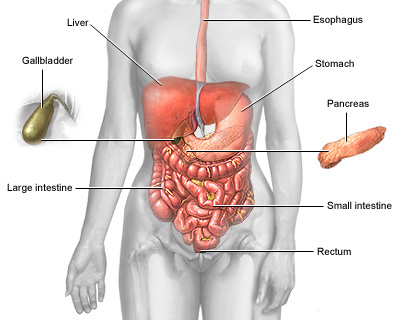Gastritis
Contents
When to Contact a Medical Professional
Digestive System

The esophagus, stomach, large and small intestine, aided by the liver, gallbladder and pancreas convert the nutritive components of food into energy and break down the non-nutritive components into waste to be excreted.
Gastritis occurs when the lining of the stomach becomes inflamed or swollen.
Gastritis can last for only a short time (acute gastritis). It may also linger for months to years (chronic gastritis).
Causes
The most common causes of gastritis are:
· Certain medicines, such as aspirin, ibuprofen, or naproxen
· Heavy alcohol drinking
· Infection of the stomach with a bacteria called Helicobacter pylori
Less common causes are:
· Autoimmune disorders (such as pernicious anemia)
· Backflow of bile into the stomach (bile reflux)
· Cocaine abuse
· Eating or drinking caustic or corrosive substances (such as poisons)
· Extreme stress
· Viral infection, such as cytomegalovirus and herpes simplex virus (more often occurs in people with a weak immune system)
Trauma or a severe, sudden illness such as major surgery, kidney failure, or being placed on a breathing machine may cause gastritis.
Symptoms
Many people with gastritis do not have any symptoms.
Symptoms you may notice are:
· Nausea and vomiting
· Pain in the upper part of the belly or abdomen
If gastritis is causing bleeding from the lining of the stomach, symptoms may include:
· Black stools
· Vomiting blood or coffee-ground like material
Exams and Tests
Tests that may be needed are:
· Complete blood count (CBC) to check for anemia or low blood count
· Examination of the stomach with an endoscope (esophagogastroduodenoscopy or EGD)
· H. pylori tests
· Stool test to check for small amounts of blood in the stools, which may be a sign of bleeding in the stomach
Treatment
Treatment depends on what is causing the problem. Some of the causes will disappear over time.
You may need to stop taking aspirin, ibuprofen, naproxen, or other medicines that may be causing gastritis. Always talk to your doctor before stopping any medicine.
You may use other over-the-counter and prescription drugs that decrease the amount of acid in the stomach, such as:
· Antacids
· H2 antagonists: famotidine (Pepsid), cimetidine (Tagamet), ranitidine (Zantac), and nizatidine (Axid)
· Proton pump inhibitors (PPIs) -- omeprazole (Prilosec), esomeprazole (Nexium), iansoprazole (Prevacid), rabeprazole (AcipHex), and pantoprazole (Protonix)
Antacids may be used to treat chronic gastritis caused by infection with Helicobacter pylori bacteria.
Outlook (Prognosis)
The outlook depends on the cause, but is often very good.
Possible Complications
Blood loss and increased risk of gastric cancer can occur.
When to Contact a Medical Professional
Call your health care provider if you develop:
· Pain in the upper part of the belly or abdomen that does not go away
· Black or tarry stools
· Vomiting blood or coffee-ground-like material
Prevention
Avoid long-term use of substances that can irritate your stomach such as aspirin, anti-inflammatory drugs, or alcohol.
Source: https://www.nlm.nih.gov/medlineplus/ency/article/001150.htm

